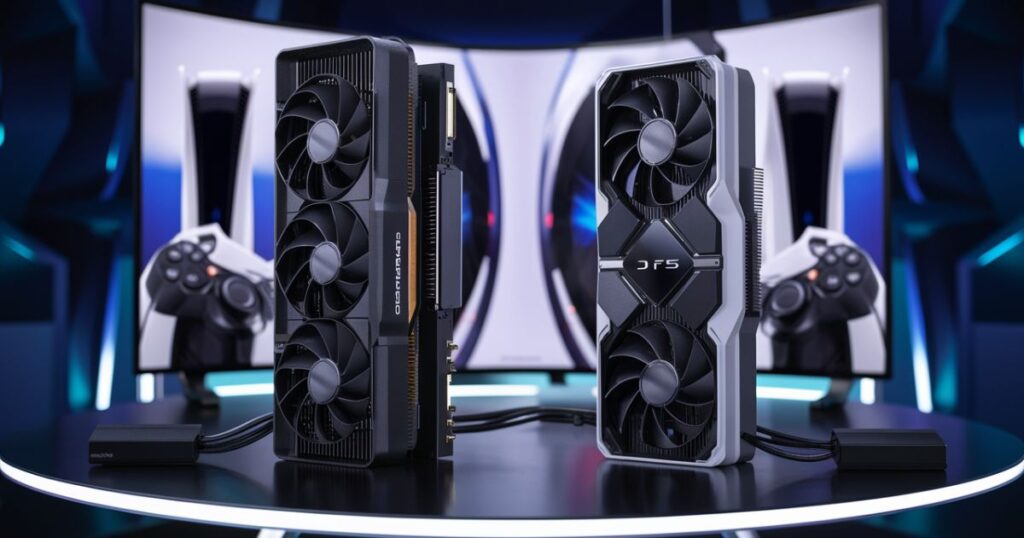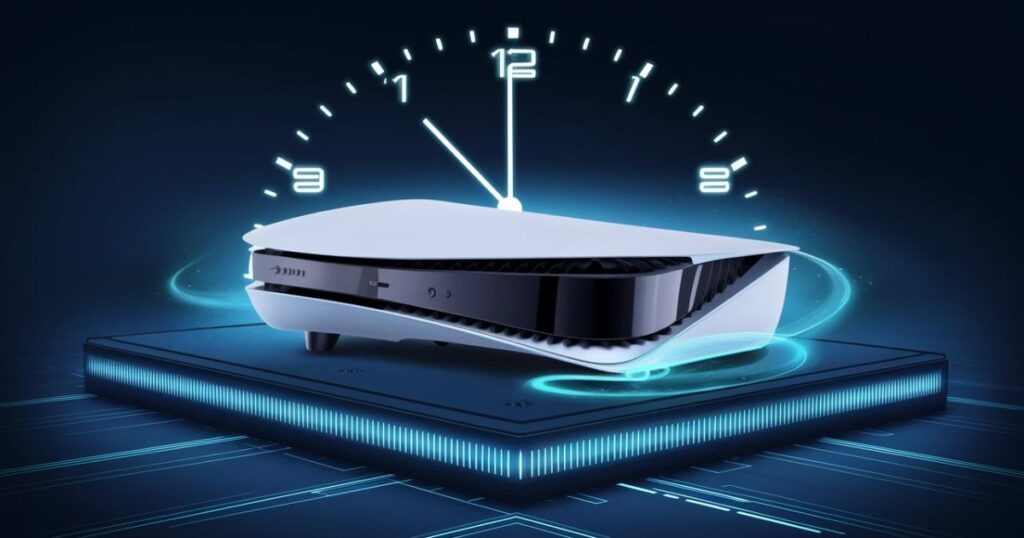The PlayStation 5 (PS5) has revolutionized the gaming industry with its impressive hardware capabilities, leaving many PC enthusiasts wondering how their rigs stack up against Sony’s latest console.
In this comprehensive guide, we’ll explore the question: “What PC specs are equivalent to PS5?” We’ll dive deep into each component, comparing the PS5’s hardware to its PC counterparts, and provide you with all the information you need to understand how a gaming PC can match or even exceed the PS5’s performance.
Understanding the PS5’s Hardware
Before we delve into PC equivalents, it’s crucial to understand what makes the PS5 tick. The console boasts a custom-designed system-on-chip (SoC) that integrates a powerful CPU and GPU, along with other components, to deliver a seamless gaming experience.
Key PS5 specifications include:
- CPU: Custom 8-core AMD Zen 2, variable frequency up to 3.5 GHz
- GPU: Custom AMD RDNA 2, 10.28 TFLOPs, 36 CUs at 2.23 GHz
- RAM: 16 GB GDDR6
- Storage: Custom 825 GB SSD
- I/O Throughput: 5.5 GB/s (raw), 8-9 GB/s (compressed)
These specifications set a high bar for gaming performance, making the PS5 a formidable opponent to gaming PCs. However, with the right components, a PC can match or even surpass the PS5’s capabilities.
CPU Comparison: PS5 vs PC
The PS5’s CPU is a custom 8-core AMD Zen 2 processor with a variable frequency up to 3.5 GHz. This powerful chip is designed to handle complex game logic, physics simulations, and AI calculations with ease.
When looking for a PC CPU that’s equivalent to the PS5, two strong contenders emerge:
- AMD Ryzen 7 3700X
- AMD Ryzen 9 3900X
The Ryzen 7 3700X is perhaps the closest match, featuring 8 cores and 16 threads with a base clock of 3.6 GHz and a boost clock of 4.4 GHz. This CPU offers similar multi-threaded performance to the PS5’s chip, making it an excellent choice for a PS5-equivalent build.
For those seeking even more power, the Ryzen 9 3900X with its 12 cores and 24 threads can outperform the PS5’s CPU in most scenarios. However, it’s important to note that games are rarely optimized to take full advantage of such high core counts, so the performance gain in gaming scenarios might be minimal.
When comparing these CPUs to the PS5, it’s crucial to remember that the console’s chip is optimized specifically for gaming tasks. PC CPUs, while more versatile, may not always match the efficiency of a purpose-built console CPU in gaming scenarios. However, they offer the advantage of better performance in non-gaming tasks and the ability to upgrade in the future.
GPU Equivalents: Matching the PS5’s Graphics Power

The PS5’s GPU is a custom AMD RDNA 2 chip capable of 10.28 TFLOPs with 36 compute units running at 2.23 GHz. This powerful graphics processor enables the PS5 to deliver stunning visuals, including ray tracing effects, at 4K resolution.
To match the PS5’s graphical prowess, PC gamers have several options:
- AMD Radeon RX 5700 XT
- NVIDIA GeForce RTX 2070 Super
- NVIDIA GeForce RTX 3060 Ti
The AMD Radeon RX 5700 XT offers similar raw performance to the PS5’s GPU, with 9.75 TFLOPs of computing power. However, it lacks hardware-accelerated ray tracing, a feature present in the PS5.
The NVIDIA GeForce RTX 2070 Super and RTX 3060 Ti both offer comparable or better performance than the PS5’s GPU, with the added benefit of more mature ray tracing and DLSS (Deep Learning Super Sampling) technologies. These cards can deliver excellent 4K gaming experiences and even surpass the PS5 in some scenarios.
It’s worth noting that while teraflops are a useful metric for comparing raw GPU power, they don’t always translate directly to gaming performance. Factors such as driver optimizations, game engine efficiencies, and API implementations can significantly impact real-world performance.
Storage Solutions: SSDs That Compare to PS5
One of the PS5’s most impressive features is its custom 825 GB SSD, which offers blazing-fast load times and enables new game design possibilities. The console’s SSD boasts a raw throughput of 5.5 GB/s, which can reach up to 8-9 GB/s with compression.
To match this level of performance on a PC, you’ll need a high-speed NVMe SSD. Two excellent options are:
- Western Digital Black SN750 NVMe SSD
- Samsung 970 Pro NVMe SSD
Both of these SSDs offer sequential read speeds of up to 3,500 MB/s, which, while not quite matching the PS5’s raw speed, come close enough to provide a similar experience in most gaming scenarios. It’s important to note that the PS5’s custom I/O complex and dedicated decompression block contribute significantly to its storage performance, which is challenging to replicate exactly on a PC.
For those looking to future-proof their builds, consider PCIe 4.0 SSDs like the Samsung 980 Pro or Western Digital Black SN850, which can reach sequential read speeds of up to 7,000 MB/s, potentially surpassing the PS5’s storage performance.
Read Also: Can You View Blink Cameras on Computer? The Ultimate Guide for 2024
RAM and Memory: How Much Do You Need to Match the PS5?
The PS5 comes equipped with 16 GB of GDDR6 memory, which is shared between the CPU and GPU. This unified memory architecture allows for efficient data transfer between components.
To match or exceed the PS5’s memory configuration on a PC, consider the following:
- 16 GB DDR4-3200 RAM (minimum)
- 32 GB DDR4-3600 RAM (recommended for future-proofing)
While 16 GB of RAM is sufficient for most current gaming needs and matches the PS5’s specification, opting for 32 GB can provide headroom for multitasking, streaming, and future game requirements. Additionally, faster RAM speeds can contribute to better overall system performance, especially with AMD Ryzen CPUs.
Audio Technology: Replicating PS5’s 3D Audio on PC
The PS5 features a custom Tempest 3D AudioTech engine, which delivers immersive 3D audio through any audio output, including TV speakers, soundbars, and headphones. While it’s challenging to replicate this exact technology on a PC, there are solutions that can provide similar immersive audio experiences:
- ASUS Xonar SE sound card
- Creative Sound Blaster AE-9 sound card
These dedicated sound cards offer high-quality audio processing and support various surround sound technologies. Additionally, software solutions like Dolby Atmos for Headphones or DTS Headphone:X can provide immersive 3D audio experiences on PC.
It’s worth noting that many modern gaming headsets also come with their own 3D audio processing capabilities, which can deliver excellent spatial audio without the need for additional hardware.
Building a PC with PS5-Equivalent Specs: Cost Analysis
When considering building a PC with specs equivalent to the PS5, it’s important to factor in the cost. Here’s a rough breakdown of component costs (prices may vary):
| Component | Estimated Cost |
| CPU (AMD Ryzen 7 3700X) | $300 |
| GPU (NVIDIA RTX 3060 Ti) | $400 |
| RAM (16 GB DDR4-3200) | $80 |
| SSD (1TB NVMe) | $150 |
| Motherboard | $150 |
| Power Supply | $100 |
| Case | $80 |
| Total | $1,260 |
Compared to the PS5’s $499 price tag for the disc version, building a PC with equivalent or better specs is significantly more expensive. However, it’s important to consider the long-term value:
- PCs offer more versatility and can be used for tasks beyond gaming
- PC components can be upgraded individually over time
- PC games are often cheaper, especially during sales
- No subscription is required for online gaming on PC
Pros and Cons: PS5 vs Equivalent PC
When deciding between a PS5 and an equivalent PC, consider the following pros and cons:
PS5 Pros:
- Optimized for gaming performance
- Exclusive game titles
- Plug-and-play simplicity
- Lower initial cost
PS5 Cons:
- Limited upgradeability
- Subscription required for online play
- Less versatile than a PC
Equivalent PC Pros:
- Highly customizable and upgradeable
- More versatile (productivity, content creation, etc.)
- Larger game library, including backwards compatibility
- Free online gaming
Equivalent PC Cons:
- Higher initial cost
- Potentially more complex setup and maintenance
- Lack of some console-exclusive titles
Future-Proofing: How Long Will PS5-Equivalent Specs Last?

When building a PC with specs equivalent to the PS5, it’s natural to wonder about its longevity. Console generations typically last 6-7 years, and the PS5 is expected to remain relevant throughout this period. A PC built to match or exceed PS5 specs should remain competitive for a similar timeframe, with the added benefit of upgradability.
To ensure your PC remains capable of handling future games:
- Consider opting for components slightly above PS5 equivalence
- Plan for potential GPU upgrades in 3-4 years
- Ensure your power supply and case can accommodate future upgrades
- Stay informed about new technologies and gaming requirements
Remember that PC hardware evolves rapidly, and new components are released regularly. This allows for incremental upgrades to keep your system up-to-date, unlike consoles which remain static until the next generation.
Conclusion
To sum it up, building a PC with specs equivalent to the PS5 is certainly achievable, albeit at a higher initial cost. Key components like the AMD Ryzen 7 3700X CPU, NVIDIA RTX 3060 Ti GPU, 16-32GB of fast RAM, and a high-speed NVMe SSD can match or exceed the PS5’s performance.
While the PS5 offers optimized gaming experiences and exclusive titles, an equivalent PC provides greater versatility, upgradeability, and access to a vast game library. The choice between a PS5 and a comparable PC ultimately depends on individual preferences, budget, and needs.
Both options offer excellent gaming experiences, ensuring that whichever path you choose, you’ll be well-equipped for next-generation gaming.
FAQs: Common Questions About PS5 and Equivalent PC Specs
Can a PC truly match PS5 performance?
Yes, a PC can match and even exceed PS5 performance with the right components. However, it’s important to note that consoles often benefit from optimized game development, which can sometimes lead to better performance in specific titles.
Is building a PS5-equivalent PC worth the cost?
If you value versatility, upgradability, and access to a vast library of PC games, then the higher cost may be justified. However, if you’re primarily interested in a plug-and-play gaming experience and PS5 exclusive titles, the console might be a better choice.
How does game optimization differ between PS5 and PC?
Console games are optimized for specific hardware, allowing developers to squeeze maximum performance from the system. PC games need to account for a wide variety of hardware configurations, which can sometimes result in less optimized performance across the board.
Will a PS5-equivalent PC run all games at 4K 60fps?
While a PS5-equivalent PC should handle most games at 4K 60fps, performance can vary depending on the specific game and its optimization. Some particularly demanding titles might require lowering settings or resolution to maintain 60fps.
How often would I need to upgrade a PS5-equivalent PC?
With a PS5-equivalent PC, you should be able to play most games comfortably for 3-4 years before considering upgrades. However, this can vary based on your performance expectations and the pace of technological advancements in gaming.

Howdy, I’m passionate about exploring and sharing the latest in technology. Here to provide insights, reviews, and guides to help you navigate the tech world.